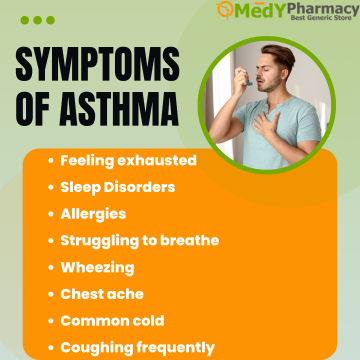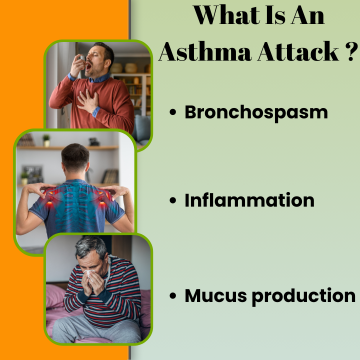Introduction:
Can asthma be cured? No. Although there is no cure, it can be controlled. As children grow older, they may outgrow their ailment. Why is my asthma worsening? To treat and avoid asthma episodes, people may take medication daily and use inhalers. You can bring medicine to help you during an attack.
Your doctor may modify your treatment strategy to help you manage your asthma symptoms. If you have a severe attack and the short-term relief medications do not work, you will require emergency care.
What is Asthma?
Asthma, or bronchial asthma, is a lung condition. It’s a chronic (continuous) illness, which means it won’t go away and necessitates continual medical attention. Maintaining calm and taking recommended quick-relief drugs can help a person manage or stop an asthma attacks. With so many potential causes of an asthma attacks, it can be difficult to take preventative measures.
Although further research is needed, preliminary evidence suggests that no single diet or nutrient can alleviate asthma symptoms on its own. People with asthma may benefit from a well-balanced diet rich in fresh fruits and vegetables.
Overview of Asthma attacks
Asthma is a condition in which your airways constrict, swell, and produce excessive mucus. This can make breathing difficult, causing coughing, a whistling sound (wheezing) as you exhale, and shortness of breath.
Asthma might be a minor irritation for some people. Others find it to be a severe issue that interferes with everyday activities and may result in a life-threatening asthma attacks.
Asthma cannot be treated, but its symptoms are manageable. Because asthma frequently varies over time, you must collaborate with your doctor to monitor your symptoms and adapt your therapy as needed.
Always take Asthalin Inhaler or Levolin Inhaler as directed; do not stop using them even if you are symptom-free.
What are the symptoms of asthma?

It’s critical to understand your asthma symptoms and what’s going on in your airways. Knowing your asthma symptoms will assist you in identifying triggers, determining when you need immediate relief medications, and recognizing a medical emergency. Asthma produces three alterations in your airways.
- Airways swelling.
- The muscles that surround the airways constrict.
- Too much mucus might obstruct the airways.
- A persistent cough, particularly at night
Some people will experience worse symptoms if they have a cold or when the temperature changes. Other triggers include dust, smoke, fumes, grass and tree pollen, animal fur and feathers, harsh soaps, and perfume.
- Wheezing while exhaling and sometimes during inhaling
- Shortness of breath or trouble breathing, sometimes even while resting
- Chest tightening makes deep breathing difficult.
Are You at Risk of Asthma?
Asthma can affect people of all ages, and there are numerous risk factors for developing asthma. Smokers are more prone to get asthma. For example, being exposed to secondhand smoke as a young child or while your mother is pregnant.
Third-hand smoke is defined as exposure to garments or surfaces in a smoking environment. Can be passed down through family history, particularly if your parents have asthma. Puerto Ricans and Blacks are more likely to develop asthma than other races.
Asthma and obesity:
Obesity, according to the Centers for Disease Control and Prevention (CDC), is a significant risk factor for asthma.
Asthma in obese adults may be more severe and difficult to manage. Eating a well-balanced diet and maintaining a healthy body weight may help you manage your disease more effectively.
Foods with high vitamin content
Vitamin C, vitamin E, and vitamin A/beta-carotene have all been thoroughly studied for their asthma-related benefits.
All are antioxidants, and vitamins C and E may have anti-inflammatory or anti-allergenic properties. Getting adequate vitamin D may help avoid asthma flare-ups.
- Bell peppers
- Oranges
- Strawberries
- Broccoli
- Brussel sprouts
- Apples
- Avocado
If you have allergies to milk or eggs, you should avoid using them as a source of vitamin D. Asthma can develop as a result of dietary allergies.
What Is An Asthma Attacks?
When you breathe normally, the muscles around your airways relax, allowing air to pass smoothly and softly. During an asthma attacks, three events can occur:

Bronchospasm: The muscles surrounding the airways tighten. They constrict, narrowing your airways. Air cannot flow freely via narrowed airways.
Inflammation: Your airway’s lining swells. Swollen airways restrict how much air enters and exits your lungs.
Mucus production: During the attack, your body makes more mucus. This thick mucus obstructs the airways.
When your airways become tighter, you generate a sound known as wheezing when you breathe, which is the sound your airways make when you exhale. You may also hear an asthma episode referred to as an exacerbation or flare-up. It refers to when your asthma is not under control.
What exactly causes an asthma attacks?
An asthma attacks can be brought on by a variety of factors. Experts recommend that a person keep a journal to track which factors trigger symptoms. This may help a person avoid subsequent triggers.
- Outdoor triggers including pollen and mold
- Indoor triggers include pet dander, mold, and dust mites.
- Physical activity (recommended), mental stress (e.g. sobbing, laughing, or severe rage), and infections are all risk factors.
- Some drugs, such as aspirin, may be affected by poor air quality or extreme cold.
What are the different types of asthma?
Asthma is classified into different categories based on the origin and severity of symptoms.
- Intermittent
This type of asthma comes and goes, allowing you to feel normal in between outbreaks.
- Persistent
Persistent asthma means that you have symptoms most of the time. The symptoms could be minor, moderate, or severe. The severity of asthma is determined by the frequency with which you have symptoms. They also examine your ability to perform tasks during an attack.
- Allergic
Some people’s allergies can trigger an asthma attacks. Molds, pollen, and pet dander are all examples of allergens.
- Non-allergic
External influences might cause asthma to flare up. Exercise, stress, illness, and the weather can all trigger a flare.
- Asthma brought on by exercise
This type is triggered by exertion and is also known as exercise-induced bronchospasm.
- Occupational Asthma
Workers who work with irritating substances are more likely to get this type of asthma.
What are the most common asthma attacks triggers?
If you come into contact with an irritant, you may experience an asthma attacks. Healthcare providers refer to these chemicals as “triggers.” Understanding what triggers your asthma makes it easier to avoid attacks.
A trigger can immediately set off an attack in some people. For other people or at different periods, an attack may begin hours or days later.
- Air pollution:
An asthma episode can be caused by a variety of external factors. Factory emissions, automobile exhaust, wildfire smoke, and other sources all contribute to air pollution.
- Dust mites:
These bugs cannot be seen, but they are present in our homes. If you have a dust mite allergy, this can trigger asthma attacks.
- Mold:
Mold can grow in wet conditions, which can be harmful for asthmatic patients. You don’t even need to be allergic to mold to suffer an attack.
- Tobacco smoke:
If you or someone in your household smokes, you are more likely to get asthma. You should never smoke in enclosed spaces such as a car or your house, and quitting smoking is the best option. Your provider can offer assistance.
What is the definition of asthma control?
- The purpose of asthma treatment is to alleviate symptoms.
- You can do what you want to do at work and at home.
- Have no (or few) asthmatic symptoms.
- You should only use your reliever medication when necessary.
- Sleep peacefully without being disturbed by asthma.
Triggers of Asthma Attacks?
Understanding the triggers of asthma episodes makes it easier to avoid them. Triggers range from individual to person. A trigger can immediately set off an attack in some people. For others, the attack may occur hours or days later. However, common triggers include air pollution such as car exhaust, manufacturing pollutants, wildfire smoke, and so on.
Dust mites are invisible to the naked eye, but they live in our homes and workplaces. If you are allergic to dust mites, this could lead to an asthma attacks.
Some of the most common Signs of asthma are:
- Cough
- Chest tightness or discomfort.
- Breathing problems
- Wheezing is a whistling sound that you make as you inhale.
- Asthma symptoms may force you to awaken at night.
- If you use a peak flow meter, a drop in the reading
Different persons may have various symptoms. Some people only have one symptom, while others have several.
There are many types of quick-relief medications.
Short-acting beta2-agonists (SABAs) are inhaled medications that expand the airways, allowing airflow during asthma attacks. Tremors and a fast heart rate are among the side effects.
Oral corticosteroids can lessen the severity of asthma symptoms.
Short-acting anticholinergics work swiftly to open up the airways. Although this medication is less effective than SABAs, it can still be taken for patients who have negative effects from SABAs.
How Do I Prevent and Treat Asthma Symptoms?
Asthma cannot be cured, but it is manageable. You may be able to spot the symptoms of an asthma attacks before it’s too late. It is critical to detect warning symptoms and take simple precautions to avoid asthma attacks. This will help you keep your asthma under control. Some common warning indicators can be:
- Itchy Neck
- Runny nose
- Feeling tired and weak.
- Lack of energy
Your doctor will assist you in recognizing all of these warning flags. If you notice symptoms on your own, take your quick-relief asthma medication right away.
Tips to Prevent Asthma
Asthma? All you need is to limit your exposure to triggers. It all starts with figuring out what causes you to cough and wheeze. There is no treatment for asthma, but there are things you may do to avoid attacks.
- Recognize asthma triggers
- Avoid Allergies
- Avoid any form of smoking
- Avoid colds
- You can allergy-proof your house
- Get Vaccinations
- Take a look at immunotherapy allergy injections
- Asthma treatment as prescribed
- Utilize a home peak flowmeter
Medications can help you manage your asthma
It never hurts to plan. In addition to taking your asthma medicine as prescribed, you can carry quick-relief asthma medication with you wherever you go. If you’re going out, remember to bring your asthma medication and find out where the nearest hospital is so you know where to go in an emergency.
Quick-relief (rescue) medicines are used to treat or prevent asthma attacks. They are taken as needed to provide immediate, short-term alleviation of symptoms. Short-acting beta-agonists, ipratropium, and oral and intravenous corticosteroids are among examples.
Medications for allergy-induced asthma are used regularly or as needed to lower the body’s sensitivity to a certain allergen. These include allergy shots and pills.
Biologics are used to help control severe asthma symptoms. They are given in conjunction with control drugs to prevent underlying biological responses that cause lung inflammation.
Medical Treatment
Asthalin 2 is a medication that can help you get rid of parasites. Parasite infections can affect a variety of locations, including the skin and intestines. Your doctor may recommend stool and blood tests to determine the severity of your parasite infection.
Strength and Dose: Generic Orcibest 10 dosages are comparable to 6 mg of generic Ivermectin. This strength is slightly stronger and contains a greater dose.
Take care of your whole health. Although taking care of your health may appear tough, it can help you prevent asthma more effectively. Always strive to get enough sleep and exercise. Stay hydrated and eat as much healthful meals as possible.
Discover stress-management techniques. To treat sudden asthma symptoms, take quick-relief drugs as soon as the symptoms appear.
Individuals’ action plans make it simple to know what to do at home if they experience an asthma attacks. Additionally, it is critical to collaborate with a doctor to build an asthma action plan. That way, you’ll know when your asthma symptoms develop and what to do if an attack happens. Medypharmacy constantly stocks all of these drugs.
























